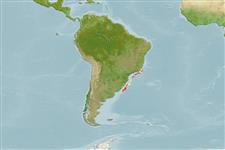ইলাসমোব্রাঙ্কি (হাঙ্গর এবং রে) (sharks and rays) >
Rajiformes (Skates and rays) >
Rajidae (Skates)
Etymology: Dipturus: Greek, di = two + Greek, pteryx = fin (Ref. 45335).
Environment: milieu / climate zone / depth range / distribution range
বাস্তুসংস্থান
সামুদ্রিক ব্যথিডিমারসাল সমুদ্র তলদেশবিহারী; গভীরতার পরিসীমা 400 - 521 m (Ref. 57911). Deep-water; 20°S - 40°S, 60°W - 40°W (Ref. 57911)
Southwest Atlantic: off Brazil, from São Paulo to Rio Grande do Sul; and Uruguay (Ref. 58839).
আকৃতি / ওজন / Age
Maturity: Lm ? range ? - ? cm
Max length : 67.0 cm TL পুরুষ/ লিঙ্গ অনিধর্ারিত ; (Ref. 57911)
Holotype taken from a depth of 500 m (Ref. 26282). Oviparous (Ref. 50449). Eggs have horn-like projections on the shell (Ref. 205).
Life cycle and mating behavior
পরিপক্কতা | প্রজনন | ডিম ছাড়া | ডিমসমূহ | ডিম্বধারন ক্ষমতা | শুককীট
Oviparous, paired eggs are laid. Embryos feed solely on yolk (Ref. 50449). Eggs have horn-like projections on the shell (Ref. 205).
McEachran, J.D. and K.A. Dunn, 1998. Phylogenetic analysis of skates, a morphologically conservative clade of elasmobranchs (Chondrichthyes: Rajidae). Copeia 1998(2):271-290. (Ref. 27314)
IUCN Red List Status (Ref. 130435)
Threat to humans
Harmless
Human uses
আরো তথ্য
Age/Size
বৃদ্ধি
Length-weight
Length-length
Length-frequencies
মরফোমেট্রিক্স
বহিঃ অঙ্গ সংস্থান
শুককীট
শুককীটের সত্রিুয়তা
নির্বাচন
প্রাচুর্য
BRUVS
সূত্র সংখ্যা এ্যাকুয়াকালচার (জলজ পালন) এ্যাকুয়াকালচার নকশা বংশ বংশানুগতিবিদ্যাElectrophoresesউতরাধিকার সুত্রে পাওয়া যোগ্যতারোগ প্রক্রিয়াজাতকরণ NutrientsMass conversion
সহযোগী ছবি সমূহStamps, Coins Misc.শব্দ ক্রোমোজোমের ধরণ গতি সাতাঁরের কায়দা ফুলকা এলাকাOtolithsমস্তিস্ক সমূহদৃষ্টি
হাতিয়ার
Special reports
Download XML
ইন্টারনেট সুত্র
Estimates based on models
Preferred temperature (Ref.
123201): 4.7 - 11.8, mean 11.2 °C (based on 3 cells).
Phylogenetic diversity index (Ref.
82804): PD
50 = 0.5000 [Uniqueness, from 0.5 = low to 2.0 = high].
Bayesian length-weight: a=0.00282 (0.00133 - 0.00596), b=3.25 (3.08 - 3.42), in cm total length, based on LWR estimates for this Genus-body shape (Ref.
93245).
ট্রফিক পর্যায়ে (Ref.
69278): 3.8 ±0.6 se; based on size and trophs of closest relatives
স্থিতিস্থাপক (Ref.
120179): নিম্ন/ , সর্বনিম্ন প্রজন দ্বিগুনের সময় ৪.৪-১৪ বৎসর (Fec assumed to be <100).
Fishing Vulnerability (Ref.
59153): Moderate to high vulnerability (47 of 100).
